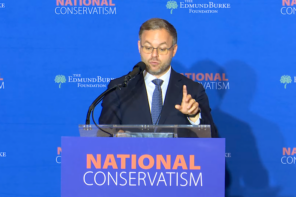There are many factors that may determine whether incumbent president Joe Biden wins reelection this November. Whether the very Catholic president is visibly “religious enough,” however, is absolutely not one of them.
If you’re one of my regular readers, this is probably as obvious to you as it is to me. But clearly it’s not obvious to everyone. There are liberal Christians out there who are sincerely convinced that the way to get Biden reelected is for him to be even more publicly religious than he already is—or, as I like to call it, doing a Dukakis, but with Jesus. Mainline Protestant author and religion commentator Guthrie Graves-Fitzsimmons recently attempted to make the case for MSNBC, a media outlet that has, of late, been obnoxiously concerned with determining what constitutes “real” Christianity.
To anyone with “eyes to see,” to borrow a turn of phrase from the gospels, the Democratic Party establishment—aided and abetted by the American punditocracy—is constantly trying too hard to argue that it’s not those “blasphemous” and “idolatrous” Christian nationalist Republicans who are the party of religion and values, but rather the Dems.* But, in the words of the great LeVar Burton, “You don’t have to take my word for it.” In his commentary, Graves-Fitzsimmons quotes Democratic Senator Chris Coons rebuking the Democratic Party for ostensibly failing “to recognize the centrality of family, faith, opportunity, and community.”
Graves-Fitzsimmons also spoke with faith outreach organizer Jen Butler, executive director of advocacy group Faith Forward, on her organization’s “six-figure ad-buy targeting religious voters around Easter.” (Let me note here, in passing, that the emphasis on Easter here implicitly conflates the meaning of “religious” with “Christian,” which is itself a problem.) According to Butler, her organization’s ads aimed “to give people a really clear moral choice that we need to put God and human dignity of all people first and foremost as we consider our choices in the election.”
Excuse me? Americans need to put God first when we go to the polls? Firstly, that is offensive on its face to me as both an exvangelical atheist and a consistent Democratic voter—albeit a progressive one who finds the Democratic establishment far too conservative for my taste. Secondly, how does this argument make sense in a country founded as a secular republic meant to maintain a sharp separation between church and state? Thirdly, whose god? I mean, what do you think the Christian nationalists are doing when they vote, if not putting God first as they understand this infinitely malleable figure?
Voting Republican is a religious imperative for the White evangelicals I grew up among, because the GOP pursues policies that line up with their “biblical worldview”—and, to be clear, this “worldview” is no less “biblical” than the liberal or progressive Christian worldview, because the Bible, too, is infinitely malleable. It contains plenty of material that can be read to support authoritarianism, just as it contains material that can be read to support liberation.
In any case, in a secular country, what two broad factions of Christians think “God” is like shouldn’t be a matter for public debate in a presidential election. But shoulds aside, is it also bad politics? Let me be clear: yes, yes it is.
Graves-Fitzsimmons’ case for a major push in Democratic “faith outreach” rests on an egregiously bad reading of cherry-picked data. To start off, he points out that very few Americans see Republican presidential candidate, former president, and indicted insurrectionist Donald Trump as “very religious”—a mere 4% according to Pew data released last month. But only 49% of White evangelicals, 63% of White Catholics, and 61% of White mainline Protestants view Trump as “not too or not at all religious,” whereas 42%, 30%, and 32% of those demographics, respectively, view Trump as “somewhat religious.” It’s important to recall at this point that majorities of all White Christian demographics voted for Trump in both 2016 and 2020. There is absolutely no reason to think that will change in 2024.
Instead of suggesting that there might be some significant section of (White) “faith” voters who can be reached given that fewer than half of White evangelicals view Trump as a “somewhat religious” man (6% of them deem him “very religious”), one should pause here to ask how the distinctive faith of these demographics affects their vote—particularly in light of data that might seem contradictory at first blush, like the findings laid out in the same Pew report that a full 91% of White evangelicals agree that it is “important to have a president who stands up for people with their religious beliefs,” while 73% of them agree it’s important that a president “has strong religious beliefs.”
Although Graves-Fitzimmons breezily admits only that “many say” White evangelicals are “a driving force” in Trump’s campaign, this is actually a fact that is not in dispute. The evidence for White evangelicals’ enduring and enthusiastic Trump support is overwhelming. So, instead of speciously arguing that, because about half of them don’t think Trump is personally religious, they could be won over, the proper response is to look into exactly why White evangelical Trump support is so solid.
The answer has always been obvious to anyone who isn’t actively trying to avoid seeing it. Majorities of all White Christians, and especially White evangelicals, support Donald Trump because he does what they want, which they conflate with “doing God’s will.” Trump has indeed done more to advance their agenda than any previous president, including George W. Bush. He’s the one who’s ultimately responsible for ending Roe on their behalf, and he moved the U.S. Embassy to Israel from Tel Aviv to Jerusalem for them, because of their apocalyptic beliefs.
And there’s something else going on here that racial voting patterns among Christians make clear. For many Christian Americans, when religion is invoked in a political context, it is clearly to a substantial degree a proxy for race. I credit this insight to my RD colleague Daniel Schultz, a UCC pastor and political analyst who recently wrote about this issue. While the relationship between race, religion, and voting has always been clear in the data, I’d never thought to put it in exactly these terms.
But recognizing that political messages about Christianity are often a proxy for race does not, of course, make those messages or the people they resonate with “not really religious.” There is no bright line where religion ends and culture or politics begins; all these things are intertwined. And it is more than evident that Christianity is compatible with the most brutal forms of White supremacy. In addition, White Christian voters are always, on the whole, going to see Democrats as both “weak” on defense (which was Michael Dukakis’s Achilles heel) and “anti-faith.” For your typical White evangelical, these things are ipso facto true of Democrats, and there’s no amount of “compromise” with or “outreach” to them that will overcome their propaganda and get them to see otherwise.
Until White liberal Christians like Graves-Fitzsimmons, Coons, and Butler are able to check their Christian privilege enough to see what the data (and numerous analysts) have been telling them, they’re going to get the politics of religion wrong. That being said, I’m not entirely opposed to faith outreach to White evangelicals and Catholics in hotly contested states and in local races where picking a few people off at the margins could in fact make all the difference.
But a grand, extravagant national faith outreach strategy to these groups is a misappropriation of resources. That money would be better spent on voter registration and ground game turnout efforts among the Democratic base, or on powerful messaging on reproductive freedom, which has worked strongly in Democrats’ favor since the illegitimately stacked Supreme Court overturned Roe. Democrats also have a lot of work to do to shore up their base this year given how many have been alienated by Biden’s refusal to stop supplying Israel with the weapons the IDF has used to commit atrocities.
It would be exceedingly foolish to now go and further alienate a large chunk of the Democratic base with calls to “put God first” in the voting booth. It’s funny, honestly, for liberal Christians to say that out of one side of their mouths while offering assurances that they’re opposed to theocracy out of the other. A large and growing chunk of the Democratic base is nonreligious, and faith outreach fanatics push the party to ignore this constituency at the party’s (and the nation’s) peril. Let me be clear: working to meet nonreligious voters where we are doesn’t have to, and should not, come at the expense of continuing to reach out to Black Protestants, who comprise the largest segment of the Democratic base.
Graves-Fitzsimmons and I agree on one thing. “The Democratic Party should be the leader in celebrating all forms of diversity and building a multireligious, multiracial coalition to defeat Trump.” All I ask of Graves-Fitzsimmons and his fellow travelers is to start acting like they mean it, which will require them to see the data as it is, not as they’d like it to be, and to take the concerns of religious minority voters and nonreligious voters seriously. I hope they get the memo, because the stakes are too high in 2024 for the Dems to pull a Dukakis again—with or without Jesus.
*This is a topic, by the way, that the author and numerous others have taken up on RD, going back to 2009, and again in 2010, 2016, 2017, 2019, 2020, 2021, 2023… and this is far from an exhaustive list – eds





